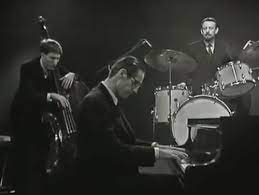I devoted a couple of hours this morning to watching these televised performances by Thelonious Monk’s Quartet and the trios of Oscar Peterson and Bill Evans on the BBC series, Jazz 625. Humphrey Littleton, the jazz trumpeter, critic and raconteur, hosted the series in the mid-‘60’s. Monk’s Quartet includes Charlie Rouse, John Ore and Ben Riley mining familiar repertoire that’s still yielding surprises from Monk’s keyboard. Ray Brown and Ed Thigpen are with Peterson, whose set kicks off with an original, “Hallelujah Time,” followed by three great jazz originals, “Con Alma,” “Waltz for Debby,” and Ray Bryant’s “Cubano Chant,” all underscored by Peterson’s marvelous orchestral conception.
The biggest surprise here is an hour-plus of The Bill Evans Trio playing twelve tunes over the course of two sets. Individual cuts from this performance have been circulating on YouTube for awhile, but here we get the performance as it unfolded in March 1965. Chuck Israels is on bass, Larry Bunker on drums, and while they are less aggressively interactive with Evans than his former trio mates Scott LaFaro and Paul Motian, this is nonetheless state-of-the-art Evans, with the added advantage of intimate camera angles. Highlights include “Nardis” and “Israel,” the former composed by Miles Davis, the latter introduced on the trumpeter’s “Birth of the Cool” sessions, both staples of Evans’s repertoire. The trio also plays “Summertime” and the Evans originals “Waltz for Debby,” and “Re: Person I Knew,” the latter an anagram for Orrin Keepnews, Evan’s longtime producer.

Evans’s biographer Peter Pettinger first saw the pianist during the engagement at Ronnie Scott’s that coincided with the appearance on Jazz 625. In Bill Evans: How My Heart Sings, he makes the following observation based on this footage: “The fact that he ended up hunched over the keyboard could be taken as a good sign—the natural force of gravity was being tapped. He started each number seated relatively upright; gradually, as the music developed, gravity took over. The lower the head fell the better Evans played. Finally, his open mouth showed that he was breathing freely—and only then would the music do likewise.”
Keith Shadwick, author of Bill Evans: Everything Happens to Me notes further that while Evans’s playing in the ‘50’s featured long lines “alternated with chordal passages and more broken, rhythmically-jagged phrases,” by 1965 the two hands play “in tandem, the lines rarely reaching the length and melodic elaboration of those earlier years.”
See for yourself. You’ll find it time well spent.
